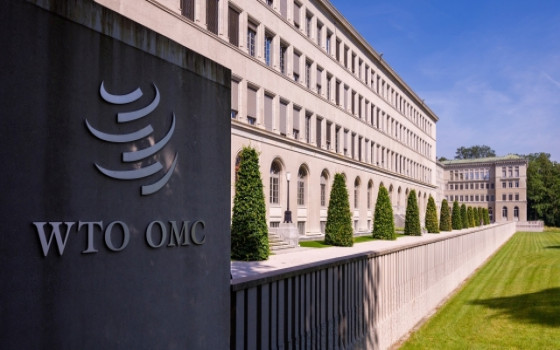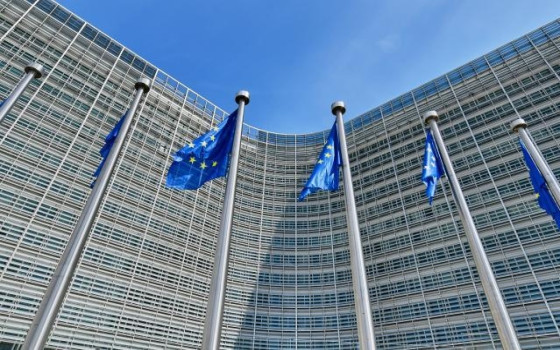The European Union at the conclusion of the Ministerial Meeting of the World Trade Organization: satisfaction with the extension of the moratorium on electronic commerce and disappointment at the lack of significant progress in the areas of agriculture and fisheries.

- Europe and Arabs
- Saturday , 2 March 2024 14:46 PM GMT
Brussels - Abu Dhabi: Europe and the Arabs
Yesterday evening, the European Commission published the closing speech of Commission Vice-President Valdis Dombrovskis before the 13th ministerial meeting of the World Trade Organization, which was hosted by Abu Dhabi in the United Arab Emirates. The European official’s speech stated, “The European Union has arrived in Abu Dhabi with an ambitious and forward-looking agenda to revitalize this organization and update the global rule book.” Multilateral cooperation within the World Trade Organization is more important than ever, at a time of geopolitical tensions, political uncertainty, and the increasing use of trade as a weapon. I am pleased that we have concluded this long week of complex negotiations with some positive results, especially with regard to trade. electronic technology, as well as important progress in development and sustainability.
On digital trade, we are very comfortable that the “e-commerce moratorium” has now been extended until the 14th Ministerial Conference, preserving free trade in online services, such as the transfer of music, movies, games, computer software or application updates. This is crucial for businesses - especially SMEs - and consumers around the world, as it enables them to engage in e-commerce and obtain electronic services at a lower cost and ease.
Nearly a quarter of global trade is digital and its importance will continue to grow.
The EU has invested significant political time and effort to build a coalition in favor of expanding this deal to include tariff-free digital trade. Going forward, we will continue our efforts at the WTO to create a more inclusive, predictable and rules-based global trading system that is fit for the digital economy. In particular, we will seek to find a long-term solution to customs duties on electronic transport. We were also pleased to celebrate the entry into force of the Agreement on the Local Regulation of Services. This would make trade for services easier in dozens of countries, to the benefit of small businesses in particular. This will reduce local service costs by an estimated €110 billion.
Sustainability and development
We have made positive progress in trade's contribution to environmental sustainability. We have continued to work on tackling plastic pollution, phasing out fossil fuels, and promoting the circular economy, among other things. The EU also hosted a meeting of the Alliance of Trade Ministers on Climate. Ministers from 61 countries also adopted voluntary trade-related measures to address the climate crisis.
The European Union has also played a leading role in achieving results that integrate developing countries more strongly into the global trading system. About 123 members of the World Trade Organization have finalized an agreement to facilitate investment and support development. This new agreement on facilitating investment for development aims to harness the economic potential of foreign direct investment to promote development in the poorest countries. The next step will be to incorporate this agreement into the WTO rule book.
The accession of two new least developed country members – Timor-Leste and the Comoros – to the World Trade Organization this week highlights the value that countries around the world continue to place on a common global rules base for trade and investment. The Ministers also adopted a decision to assist the least developed countries in their rise to a higher level of development. Along with supporting the least developed members, WTO members took a step towards improving the clear and effective implementation of special and differential treatment for all developing countries in key areas of market access standards.
Separately, several members here attended a Solidarity for Ukraine event on Sunday, two years after Russia's brutal and illegal invasion began. The participating countries pledged to facilitate Ukrainian exports and supply chains.
Fisheries and agriculture
However, we were disappointed by the lack of significant progress in agriculture and fisheries. We have not made any progress on the agricultural package, at the expense of the most vulnerable countries, despite our practical participation. The differences were too great to be resolved. We deeply regret that only one WTO Member State prevented a comprehensive agreement on banning harmful subsidies to fisheries worldwide. An agreement was on the table to build on the outcomes reached at the Twelfth Ministerial Conference, and to fulfill the mandate set by UN Sustainable Development Goal 14.6. Unfortunately, failure to reach an agreement will have the most negative impact on small island developing countries, It depends on sustainable fish stocks for the livelihood of its fishermen, which is crucial to achieving its sustainable economic development.
Dispute settlement reform.
The European Union has consistently called on WTO members to make progress on reforming the dispute settlement system, which is crucial for the legitimacy of the WTO overall and to halt the erosion of trade rules. WTO members acknowledged the progress made and reaffirmed their commitment to restoring a working dispute settlement system. at full capacity by the end of 2024. However, a solution on the reformed appeals system remains to be found. Once again, it is disappointing that no progress has been made on the appeal, despite overwhelming support from members. The European Union will continue to actively support the rules and show leadership and engagement. We hope that all our partners will replicate this can-do approach.”














No Comments Found